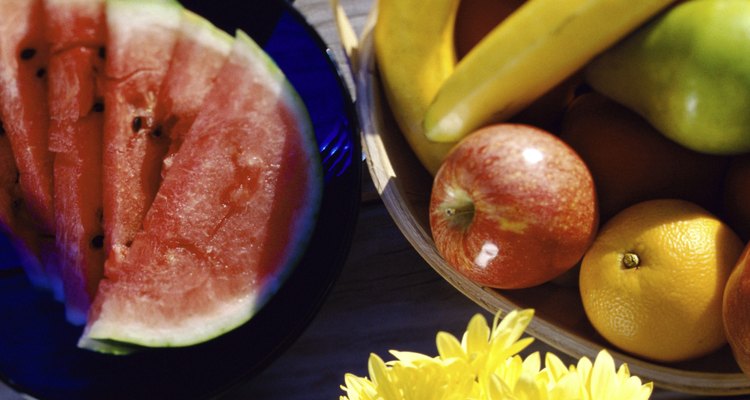
Purestock/Purestock/Getty Images
Fruit is part of a healthy diet and can be a sweet addition to any meal or snack. Fruits are chock-full of nutrients that can help keep you healthy and even help reduce the risk of disease. There is a plethora of fruit from which to choose, and as the seasons change, the seasonal fruits can be a nice complement to your typical diet.
High in Fiber
Many fruits are good sources of fiber, which is essential for health. There are two kinds of fiber: insoluble fiber and soluble fiber. Fruit contains soluble fiber, which dissolves in water to become a kind of gel-like substance. According to MayoClinic.com, fiber not only helps relieve constipation, but soluble fiber can help lower cholesterol and blood glucose levels. Fiber can also help promote weight loss because when you eat fiber, you tend to stay full longer, reducing your snacking and overeating. Although many fruits are rich in fiber, some fruits stand out in their high fiber content: 1 cup of raspberries contains 8 g of fiber; a medium pear has 5.5 g and a medium apple has 4.4 g of fiber.
Antioxidants
Various vitamins and minerals are called antioxidants, which help protect cells from damage caused by free radicals. MedlinePlus explains that free radicals may not only cause cell damage, but also contribute to the development of heart disease, cancer and other illnesses. Examples of antioxidants include beta-carotene, selenium and vitamins A, C and E. Goji berries, pomegranates and other types of berries are good sources of antioxidants, especially blueberries, states nutritionist Shirley Perryman. Berries are easy to add to cereals and oatmeal and are easy to pack in a plastic bag on the go.
Nutrients
In addition to the antioxidant benefits that vitamins and minerals provide, many kinds of fruit provide nutrients the body needs for health and proper functioning. Vitamin C helps with wound healing, boosts the immune system, and helps strengthen bones and teeth, says the University of Maryland Medical Center. Fruits with this vitamin include kiwi, mango, pineapples, cranberries and strawberries. Potassium, a mineral that functions as an electrolyte and that is needed for cells, tissues and organs to function properly, is found in bananas, citrus juices and cantaloupes.
Reduced Risk of Obesity
Obesity and overweight are serious health issues and can lead to illnesses like diabetes, heart disease, osteoarthritis, high blood pressure and cancer, says the Centers for Disease Control and Prevention. Substituting fruit for candy or other high calorie, high-sugar food can help you cut calories because fruit typically has fewer calories than high-fat foods. It will also help fill you up, reducing the likelihood of overeating or consuming empty calories, which leads to weight gain.
Related Articles

The Function of Fruits

Nutrition Information on Blueberries
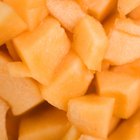
How to Make Melon Ice Cream
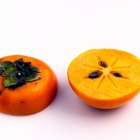
What Are the Benefits of Persimmons?

What Are the Benefits of Grapefruit for ...

Fruit & Water Diet
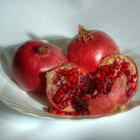
How Much Pomegranate Juice Should One ...
The Best Fruits for Breakfast

Nutrition Drinks for Diabetics
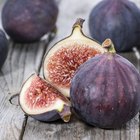
What Fruits Are Considered Aphrodisiacs?

How to Make a Fruit Reduction

Low Carb Peanut Butter Snacks
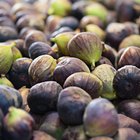
How Much Fiber Is in Fresh Figs?
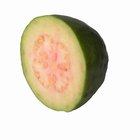
How to Peel Guava

How to Freeze a Prickly Pear Cactus
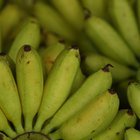
List of Tropical Fruits

Does Mango Turn Brown?

How to Blanch Kale for Freezing

Is an Orange Healthy to Eat for Your ...

Types of Fruit Smoothies
References
- MayoClinic.com; Dietary Fiber: Essential for a Healthy Diet; Mayo Clinic Staff; November 2009
- MayoClinic.com; High-Fiber Foods; Mayo Clinic Staff; November 2009
- MedlinePlus; Antioxidants; April 2011
- University of Maryland Medical Center: Vitamin C (Ascorbic Acid); Dr. Steven Ehrlich; 2009
- University of Maryland Medical Center: Potassium; Dr. Steven Ehrlich; 2009
Writer Bio
Jaime Herndon has been writing for health websites since 2009 and has guest-blogged on SheKnows. After graduating with a Bachelor of Arts in psychology and women's studies, she earned a Master of Science in clinical health psychology and a Master of Public Health in maternal-child health. Her interests include oncology, women's health and exercise science.
Photo Credits
Purestock/Purestock/Getty Images